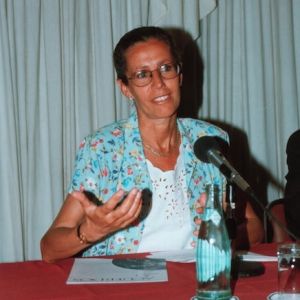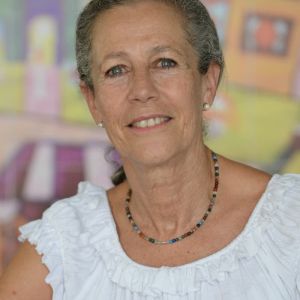Well, I think that, for most Chileans, that is a day that is equivalent to earthquakes, that we always remember where you were or what was happening because they are days that mark you and impregnate your life and that you are permanently remembering and you like to talk about it, don’t you? For me personally, that event and the days leading up to it are probably some of the most exciting moments of my life. Because I felt the community, I felt a vibe where everyone was a hero, an anonymous hero, who was in some way taking a risk for what was happening, but because you really felt that it was one of the most important things you were going to do in your life, which was to turn out that day and mark your vote, right? But also, the dark side, and well, the complicities that were going on. I remember that I belonged to a campaign called Sharing the Table that supported the common pots of women who had nothing to eat. There was a twenty-something percent unemployment rate, so the women asked for money, rather they asked for leftover food at the fair, leftover vegetables and fruit, and they all cooked together, and then the families would arrive with their little pot and with great dignity they would leave and serve lunch at home. They didn’t eat there, it was very dignified, wasn’t it? But also, we collected money to be able to support them with other food, and when the volunteer was a volunteer of Sharing the Table in an office, he did not say who he was, he did not say what it was for, people simply looked each other in the eyes, a minute of silence, and sometimes very little money arrived but you felt that you were in such an important cause, that in these cases a Chilean family would be able to eat. So in that context, and also in the context of the end of the Cold War that was also happening at that time, in which the world looked like it could change. And the end of the Soviet Union, and the Berlin Wall and our plebiscite, are two parts of the same current in which ordinary citizens could make a difference.
I think that the most beautiful thing about the campaign was to have empowered the citizen, because we knew that one thing was the leaders, the people who were thinking about the campaign, but we knew that the power was in each one of us. I think it is also a message left by the end of the Cold War, that the destinies of the world are not necessarily played by the rulers, but it is the citizen’s feeling, and therefore, one is not a drop of water, which is lost in the sea, but we are a drop of water that forms the wave of change. Every time I see the strip, I get excited because those people played with their skin, in that minute of daring, of being the giraffe that raises its neck in a crowd that was trying to hide so that no one would suspect you and that the dictatorship would silence you, no? So, the people who acted in that strip, really exposed themselves and exposed themselves a lot, but I think that the tone of optimism, of all the possibilities that could come, that we could occupy the public space, that we could be irreverent, that we could meet and embrace each other with joy. I think all these kinds of messages were very important especially for a young generation, for whom public space had become dangerous. So people tended to seclude themselves at home and hopefully no one would know what was behind the door of your house. So, by going out and expanding, and with joy and with humor, but above all with a lot of love, and love for the collective, I think that was wonderful.
My three children are involved in public policy, all three are so grateful for the opportunity, unlike their peers of their generation, that in our house we talked about these things. We received self-visual and written material about what was happening, from Teleanalysis, of course from all the videos that were made, from the magazines, we were subscribers of course, and it was very rare. My daughter, for example, was a classmate of two Christian democratic leaders, and in all their classes they were the only three little girls who were for the No. And I remember that in a poetic act she painted the No on all the poles of the block, especially the one in front of our house. And how could I explain to a little girl that what she was doing was quite risky? I mean, well, you were pointing out that that home was for the No, and clearly that was risky at the time. That to the best of our ability, each one of us got involved. That is something that marked my children. That was what that day was for me.
And the dark side, by the way, was when the evening fell, and it got dark and we were all glued to the television and we were watching something like the road runner or an animated monkey and the minutes passed and we somehow all guessed what was being discussed at that minute and that it was nothing more and nothing less than a new civil war. So, deep relief indeed when General Matthei enters the coin and says “The No won.” We were at home in the house in the family, and of course we went out afterwards we went out to celebrate, and that as at that time we went out to cacerole to manifest our position, here it was to conquer something that we knew was so important for all Chileans, as was the return of democracy.
Well, the next day I imagine myself as when the painter stands in front of a blank canvas and has all the palette of colors, not to feel that. Of having all the palettes of colors, and that now what each one of us drew on that canvas was what we made real, which was the slogan “La alegría ya viene” (Joy is coming). I believe that all Chileans are a little bit ungrateful, certainly joy could have been better, the issue of economic recovery could have been faster. Undoubtedly we could also try to preserve more that sense of community and not let individualism impregnate us. That is something that happened to us Chileans. But in spite of understanding that we could do better, I believe that the step we took was an example for the world. How with a pencil you could get rid of a tyranny that was very hard.


